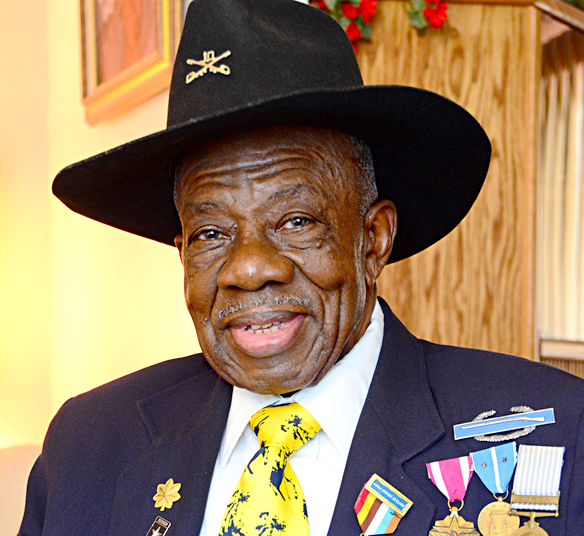As fast and athletic as Andrew Aaron was, he couldn’t get out of the way in time. A North Korean artillery shell hit the bridge he was standing on, blowing him into the air. He landed a short distance away, sustaining injuries to his shoulder and knee; shrapnel from the shell peppered his body. It was at that moment that the young man from New Orleans realized he was a long way from home.
The journey had begun several years earlier, in 1948, when Andrew Aaron answered the call to serve.
As fast and athletic as Andrew Aaron was, he couldn’t get out of the way in time. A North Korean artillery shell hit the bridge he was standing on, blowing him into the air. He landed a short distance away, sustaining injuries to his shoulder and knee; shrapnel from the shell peppered his body. It was at that moment that the young man from New Orleans realized he was a long way from home.
The journey had begun several years earlier, in 1948, when Andrew Aaron answered the call to serve.
“The military had a recruitment drive going on at my high school, so I joined up,” Aaron recalled. “I was only sixteen and had to lie about my age, but I think they were just looking for warm bodies, so they didn’t care.”
Age was not a great area of concern for the military, but skin color was, and Aaron found himself and other African-American recruits segregated from the whites when he attended boot camp at Fort Knox, Ky. It was source of puzzlement for the young soldier.
“We would mix with the white soldiers from time to time, and I wondered why they didn’t put us all together; we all seemed to get along fine,” Aaron said.
Segregation not withstanding, young Aaron excelled in boot-camp and looked at it as a great competition. A former welterweight boxer, Aaron thought of the experience as one more great physical challenge in his life.
After graduating from boot-camp, Aaron was assigned to the 10th Calvary, one of the last remaining units of the storied “Buffalo Soldiers.”
Established in 1866, the origin of the nickname “Buffalo Soldiers” has confounded historians, although all agree that it was a complimentary term given to the soldiers by the Native American tribes they fought against. Aaron was proud to be assigned to the legendary unit.
“I knew what it meant, and what the men who had come before me had done to earn the term.”
At age 17, he was shipped to Japan, and then before long, to Korea. By now, the 10th Calvary had essentially been disbanded, and so Aaron was assigned to the 24th Regiment, one of the original four Buffalo Soldier regiments. He and his fellow Buffalo Soldiers headed into battle, in what everyone thought was going to be a short-term conflict. Instead, Aaron found himself deep in the mix.
“Combat is like a nightmare, and you realize real quick that you have to work as a team if you want to survive,” he said.
The 24th Regiment did much more than just survive, they saw the first victory in the Korean War. After a short stint in Japan to recover from his wounds from the artillery attack, Aaron returned to combat operations in Korea.
By now, the military had become desegregated and the 24th was disbanded. Aaron joined his fellow African-American soldiers by becoming a part of the 2nd division. He received a Combat Commission, to 2nd Lieutenant in 1951. He spent a total of 19 months in Korea before returning to the states where he continued to serve his country, both as a U.S. Customs agent, and an active Army reservist.
Trooper Andrew Aaron retired from the Army as a Major, with more than 30 years of military service, including service during the Vietnam War. Along the way, he found and married Geraldine Aaron, the love of his life, and together they raised a family. He was once honored to be California “Veteran of the Year” and has also held the office of president of the Los Angeles Chapter of the 9th and 10th (Horse) Cav. Association. He has dedicated himself to the development of the Aaron Community Cultural Center, a Buffalo Soldier Museum and Cultural Center in the Los Angeles area, where he hopes that this effort will inspire others from all backgrounds to achieve their goals, even in the face of adversity.
Visit www.buffalosoldiersonlinemuseum.com.
For information on how to become one of Gardena's Honored Veterans, go to www.ci.gardena.ca.us/Stories/honored%20veterans.html.
Christopher J. Lynch is a Gardena resident and is the author of Eddie: The life and times of America’s preeminent bad boy, an authorized biography of Ken Osmond, the actor who played the unctuous truant Eddie Haskel on Leave it to Beaver;
www.christopherjlynch.com.

















